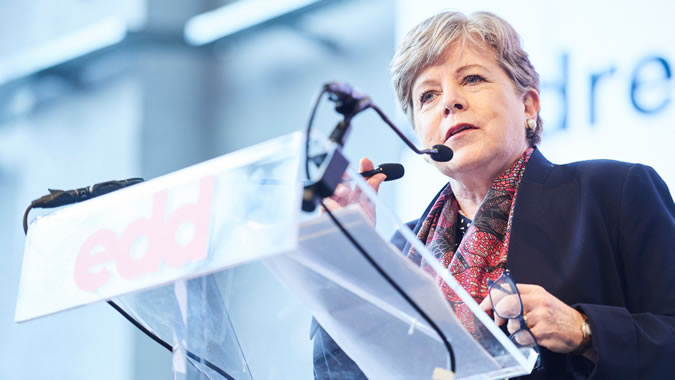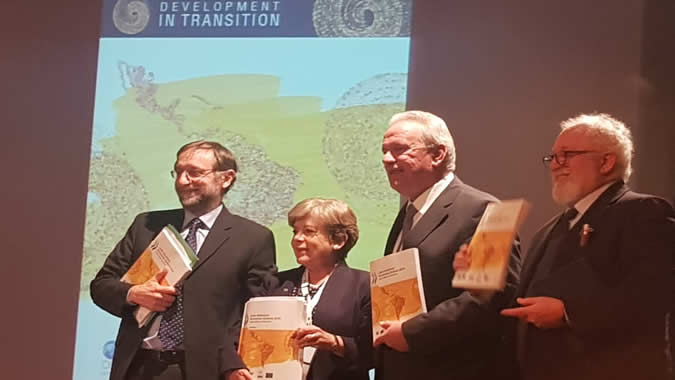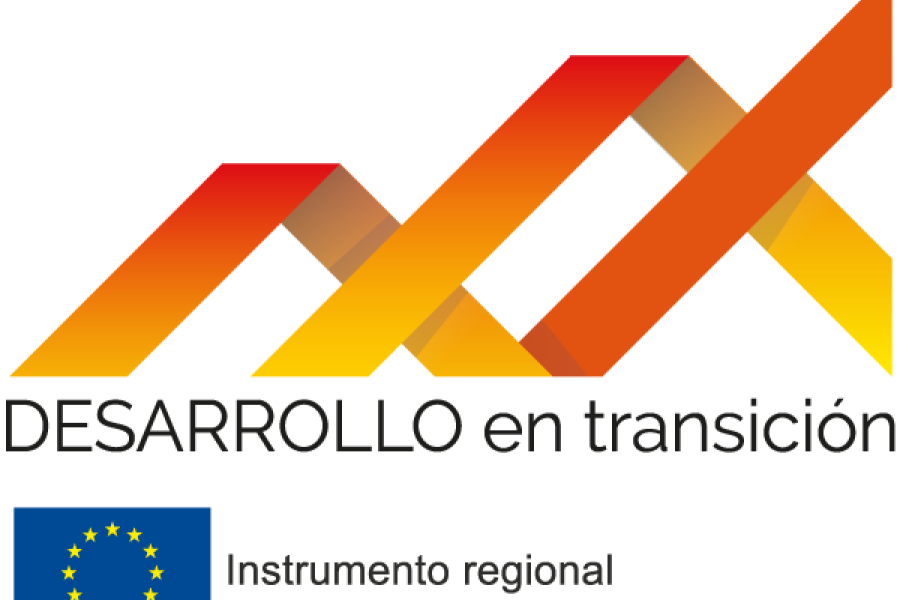Alicia Bárcena Proposes a Cooperation Narrative that is Inclusive of Middle Income Countries: Development in Transition
ECLAC’s Executive Secretary spoke today on behalf of United Nations Secretary-General António Guterres in the European Development Days 2019, which were held in Brussels, Belgium, thereby concluding her participation in the event.

The Executive Secretary of the Economic Commission for Latin America and the Caribbean (ECLAC), Alicia Bárcena, highlighted the deepening of cooperation between Europe and Latin America and the Caribbean with a view to forging a new development narrative, at the conclusion of her participation in the European Development Days 2019 held in Brussels.
In the Belgian capital, the regional commission’s most senior representative participated in diverse sessions of the European forum and held bilateral meetings with prominent figures from Latin America and Europe.
On behalf of the United Nations Secretary-General, António Guterres, Alicia Bárcena spoke today at the closing ceremony of the European Development Days along with Neven Mimica, European Commissioner for International Cooperation and Development; Stefano Manservisi, Director-General at the European Commission’s DG for International Cooperation and Development; Arancha Gonzalez, Executive Director of the International Trade Center; and Margaret Orech, Director of the Uganda Landmine Survivors Association.
Notable young leaders also participated in the ceremony, including Mwala Mooto of Zambia, Leticia Pinheiro Rizério Carmo of Brazil and Rejoice Namale of Malawi.
In her remarks, Alicia Bárcena noted that with 1.8 billion people between ages 10 and 24, the world is younger than ever today. For that reason, she said, “we have an unprecedented opportunity to move towards the strengthening of social rights and to do things the right way.”
She added that, despite its importance, youth is largely an invisible stage of life as far as public policies are concerned. On the contrary, she said, when young people are referred to, they often appear as objects of policies and not as rights holders or agents of development and productive change.
Alicia Bárcena specified that in Latin America and the Caribbean, young people between 15 and 29 years of age account for 163 million people, or about one-fourth of the region’s total population. However, they find themselves at a crossroads that embodies the expectations for and the risks of a region whose promising economy is decelerating, posing a challenge to social, political and economic progress.
“Sixty-four percent (64%) of Latin American youth live in poor or vulnerable households and they have not been able to enter the consolidated middle class. We need to provide them with formal labor positions and good public services if we want them to trust in institutions,” Alicia Bárcena affirmed.
The senior United Nations representative stressed the need to reduce inequalities throughout the world, in all countries, and across all generations. “We need to fight against inequality and promote freedom and dignity,” she indicated.
She added that inequality is a threat to sustainable development and that, in contrast, equality is not only a right, but it is also efficient from an economic viewpoint, along with being an ethical and political imperative.
Earlier in the day, Alicia Bárcena participated in the European launch of the report Latin American Economic Outlook 2019: Development in transition, produced by ECLAC in conjunction with the European Commission, the Development Center of the Organization for Economic Cooperation and Development (OECD), and the Development Bank of Latin America (CAF).
During her presentation, ECLAC’s Executive Secretary explained that, recognizing the needs of countries in transition on the issue of international cooperation, ECLAC, the European Community and the OECD Development Center began in 2017 to promote a new narrative that reinterprets development and seeks to strengthen the role of cooperation so as to leave no one behind. “We have called this new narrative ‘development in transition,’” she stated.
She added that international cooperation, as a facilitator of development, must be based on relations of “variable geometries,” adapting to the capacities of each country in each specific area, in order to help them implement their national development priorities and align them with the Sustainable Development Goals (SDGs).
On Tuesday, June 18, meanwhile, at the start of her participation in the European Development Days 2019, Alicia Bárcena participated in the presentation of the Comprehensive Development Plan for El Salvador, Guatemala, Honduras and Mexico, where she called for creating a shared economic space between the countries of northern Central America and Mexico that promotes sustainable development and productive ecosystems, and that is focused on the structural causes of migration: insufficient economic growth with high levels of inequality; violence; wage gaps and youth unemployment; family reunification; and climate change.
The notion is to propose development with a human security approach that encompasses job security, income, education, social protection and the means of subsistence, so that migration can be an option and not an obligation.
Joining Alicia Bárcena as participants in the session were Stefano Manservisi; Jolita Butkeviciene, Director for Latin America and the Caribbean at the European Commission’s DG for International Cooperation and Development; Mauricio Escanero, Mexico’s head of Mission to the European Union; and Luis Felipe López-Calva, Regional Director for Latin America and the Caribbean of the United Nations Development Program (UNDP).
During her presentation, ECLAC’s Executive Secretary listed the structural reasons and causes for migration in the countries of northern Central America, such as insufficient growth with poverty and inequality – where the 10% with the biggest income obtains as much as 70 times more than the poorest 10% – and high youth unemployment in a subregion where nearly 362,000 young people annually seek to enter a labor market that only generates around 127,000 new jobs.
The senior United Nations official affirmed that the Plan’s objective is to produce a comprehensive and articulated development process with equality and sustainability at the center, to substantially improve the population’s quality of life and, in this context, address the migratory cycle with a focus on integration, with a territorial approach and by adopting the framework of human security, placing the right to development at the base of all efforts.
She noted that the Comprehensive Development Plan sets forth four programmatic pillars agreed upon by the four countries: economic development, social well-being, environmental sustainability and risk management, and the comprehensive management of the migratory cycle with human security.
Alicia Bárcena’s intense schedule in Brussels also included a bilateral meeting with Grete Faremo, Under-Secretary-General of the United Nations and Executive Director of the United Nations Office for Project Services (UNOPS), with whom she signed a memorandum of understanding that promotes the continual improvement of just public administration in Latin America and the Caribbean.
ECLAC’s highest representative also held bilateral gatherings with the Vice President of the Dominican Republic, Margarita Cedeño, and with the European Commissioner for International Cooperation and Development, Neven Mimica.
In addition, she met with Aina Calvo, Director of the Spanish Agency for International Development Cooperation (AECID), and Anna Terrón Cusí, Director of the International and Ibero-American Foundation for Administration and Public Policies (FIIAPP), with whom she addressed the importance of international cooperation for sustainable development.
Related content

El derecho al desarrollo en el lugar de origen es la solución para que la migración sea una opción y no una obligación: CEPAL
In a ceremony led by President Andrés Manuel López Obrador, the Executive Secretary of the UN regional commission, Alicia Bárcena, presented to Mexico a proposal for the El Salvador-Guatemala…

A Call for a Renewed, Inclusive Multilateralism: Latin America and the Caribbean at Forefront of New Forms of International Co-operation
ECLAC, the Development Bank of Latin America (CAF), the European Union and the Development Centre of the OECD launched in Buenos Aires the Latin American Economic Outlook (LEO) 2019.

ECLAC Reaffirms Need to Create New Instruments and Spaces for Cooperation at BAPA+40 Conference
The organization’s delegation, headed by its Executive Secretary Alicia Bárcena, is participating in the 2nd High-level United Nations Conference on South-South Cooperation, being held in Buenos…
Country(ies)
- Latin America and the Caribbean
- Europe
- European Union
Related project(s)
Contact
Public Information Unit
- prensa@cepal.org
- (56 2) 2210 2040
